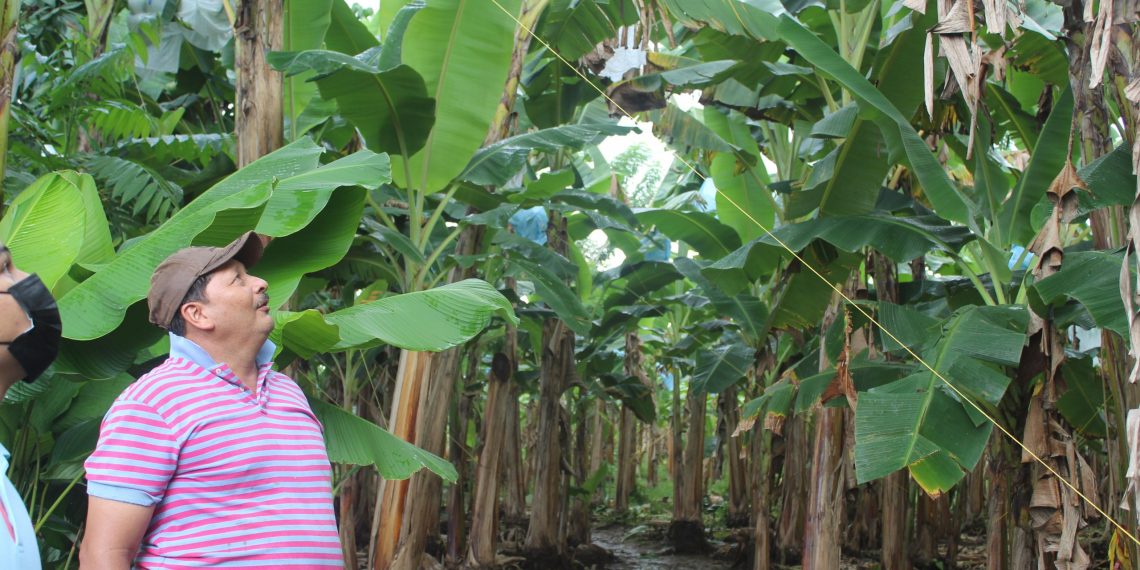Love for the land: a legacy of hope
By Gina Buendia
Alexis Aparicio inherited the love to cultivate the soil from his father. Despite the constrain, the collaborative work of small community growers allowed him to develop a sustainable activity.

Credit: Gina Buendía/UN Panama
From the airplane, minutes before landing in the province of Bocas del Toro, in the Republic of Panama, it can be seen the majestic green of the lands cultivated of plantains. A product that, during the years, has moved the economy of the region.
Bocas del Toro is located on the border between Panama and Costa Rica.
For years this province has been recognized as one of the main areas of plantain production in Panama. Still, there are also stories of small growers who saw the opportunity to cultivate the land for subsistence and commercialization.
This is the case of Alexis Aparicio, a 54-year-old grower who saw his father’s love for agriculture activity in The Balas Pit Farm.
The Balas Pit Farm, located in the community of Empalme, has 19 hectares of land. In the 1990s was focused on cattle farming, but in 2005, Alexis and his family saw the opportunity cultivating plantains.
With the support of his family and two other people, they cultivated 8 hectares of land. After the first harvest, they realized they have an export quality plantain. The exportation and selling of its product wouldn’t be easy, but Alexis would not give up.
First, Aparicio, along with his family, joined Association of Agricultural Producers and ProDefensa Ecológica de Balas Pit (APROADEBP). The association, made up of ten families with the same vision, decided to use the infrastructure donated by the Government through the Sustainable Development Council (CONADES) to package and distribute the bananas. In addition, association members began training on marketing and commercialization.
In the beginning, they sold the plantains to intermediaries’ buyers that pass through the farms; however, the profits versus the production costs were not profitable.
By that time, Alexis and other farmers decided to negotiate with supermarkets and other businesses to sell the plantains, with no intermediaries, to have better incomes.
Been part of a well-structured organization was an advantage that attracted new growers and increased its production capacity. Today, the plantains grown by the Association members are sold in the main supermarkets in Panama.
These agreements with the supermarkets have allowed them to generate weekly incomes necessary to keep the farms operating and providing food to their families.
Initially, the Association members wanted to export their plantains; however, after exporting to Miami and New York in the EEUU, they identified the need to carry a profound market analyst before exporting plantains again to that market.
SUSTAINABILITY AND FOOD SECURITY
To Alexis Aparicio, the most challenging thing is maintaining the production rhythm, especially due to the extreme climate and the increase in production and transportation costs.
The pandemic negatively affected many lives, but for people like Alexis, the impact was different. Being a key player in the food chain, he quickly adjusted to supply his product to supermarkets. During the quarantine measure decreed by the Government of Panama to stop COVID-19 spread, people like Alexis Aparicio became food heroes.
Amid the pandemic, national farmers had a great responsibility to guarantee the population’s food security.
Annually, APROADEBP harvests about 4 thousand boxes of plantain, that is about 240 thousand fingers of plantain per year. This production allows the 43 families Association members to guarantee their own sustenance and provide food to their relatives.
The Association has maintained a good harvest rhythm, but the challenges today are greater than before. To face the difficulties, small community-based grower’s organizations require to strengthen their commercialization and industrialization capacities. In addition, strengthening national farmers is vital to guarantee the sustainability of the food systems.
In Panama, the provinces with the highest plantain’s productions are Chiriquí, Bocas del Toro, the Emberá Indigenous Comarca, Darién, and the Province of Panama.
In May, the Government of Panama carried out eight Food Systems Dialogues with more than 700 key food chain actors. The results of these consultations will be part of the report that Panama will present during the United Nations Summit on Food Systems this year.
Panama is one of the volunteer countries organizing national dialogues for the Food Systems Summit. The dialogues have been led by the Ministry of Social Development and the Ministry of Agricultural Development and had the technical support of the United Nations through FAO and IFAD.



